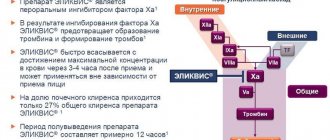The full functioning of the nervous system, as well as healthy hematopoiesis, depends on the cyanocobalamin a person receives from food. This substance, also called vitamin B12, performs a number of functions that affect the functioning of the entire body. It is known that deficiency of this substance is most often and most severely manifested in older people, but it can be observed at any age. Let's look at the reasons why deficiency develops and what role vitamin B12 plays for women.
Properties and composition of vitamin B12
Vitamin B12, which is important for women’s health, is a whole group of interconnected compounds. They are distinguished by a high level of biological activity, contain cobalt atoms and belong to corrinoids. Such components of these substances as methylcobalamin and deoxyadenosylcobalamin have a beneficial effect on the body. The analgesic, antidepressant, antiallergic and tonic properties of the compound are widely known. It is noteworthy that this substance can be stored in liver tissue for several years.
The benefits of vitamin B12
Speaking about why women need vitamin B12, first of all it is worth considering its properties as a coenzyme. This trace element promotes cell division, development and growth. With its help, energy reserves are transported to them. The benefits of vitamin B12 for women also include the following functions:
- maintaining the integrity of the myelin sheaths and ensuring the healthy functioning of the nervous system;
- maintaining the processes of formation of DNA molecules;
- activation of protein production;
- ensuring an increase in skeletal muscle mass;
- relief of pain and allergic symptoms;
- cleansing the body of toxins;
- maintaining iron absorption processes;
- prevention of pathologies affecting the cardiovascular system and degenerative changes in the brain.
Normalizes appetite and restores lipid metabolism - this is what else vitamin B12 is useful for women. This substance prevents the development of chronic fatigue. With its help, the beauty and health of the skin is ensured, because taking vitamin B 12 for women prevents the appearance of dryness, redness and inflammation. Cyanocobalamin is also necessary to prevent depressive disorders and frequent mood swings.
B vitamins: where are they found and what do they affect?
Despite their diversity, all B vitamins have one thing in common: they help improve metabolism in the human body and normalize the functioning of the immune and nervous systems.
All these vitamins are water-soluble and are quickly eliminated from the body without accumulating in it. This means that it is necessary to replenish their reserves by taking special vitamin complexes and not forgetting about foods rich in these substances.
An important fact: doctors claim that taking B vitamins in combination has a much more noticeable effect than taking any one “variety” of B vitamins.
Therefore, let's figure out what we should eat in order to reinforce the body with useful substances, which B vitamins produce and what is remarkable about each of them.
B1 (thiamine) - energy vitamin
Benefit: Helps convert fats, proteins and carbohydrates into energy. Strengthens the nervous system and improves thinking abilities.
Contains: buckwheat and oatmeal, cereal shells, wholemeal bread, green peas, asparagus, pine nuts.
B2 (riboflavin) - beauty vitamin
Benefit: takes part in all metabolic processes of the body. Improves the condition of the skin, mucous membranes, nails and hair (hence the name “beauty vitamin”), is good for vision, and promotes the production of hemoglobin.
Contains: meat, offal (liver, kidneys), chicken eggs, mushrooms, cabbage (white cabbage, broccoli, etc.), pasta, white bread, refined rice, buckwheat, cottage cheese.
B3 (nicotinic acid, vitamin PP) - vitamin of synthesis and metabolism
Benefits: helps synthesize fats and proteins, promotes the production of energy from food, reduces the level of “bad cholesterol” in the blood. In addition, vitamin B3 helps normalize venous and blood pressure and stimulates the functioning of the cardiovascular system.
Contains: fish, milk, egg yolk, nuts, liver, kidneys, yeast, buckwheat, green vegetables, legumes, meat, potatoes.
B4 (choline) - a vitamin responsible for blood sugar
Benefits: this vitamin is important for the normal functioning of the nervous system and is useful for stress. In addition to its calming effect, B4 will help your thinking abilities. But most importantly, this vitamin regulates blood sugar levels. It also normalizes fat metabolism, which has a positive effect on your weight.
Contains: offal (kidneys, liver), egg yolk, dairy products (cheese, cottage cheese), cabbage, spinach, legumes, various unrefined vegetable oils, meat, fish.
B5 (pantothenic acid) - healing vitamin
Benefits: helps wounds heal faster, promotes the synthesis of antibodies, fatty acids, hemoglobin, and participates in the processes of cellular energy production.
Contains: poultry, fish roe, heart, liver, kidneys, yolk, buckwheat and oatmeal, green leafy vegetables, peas, hazelnuts, yeast.
B6 (pyridoxine) - vitamin for the nervous system
Benefit: participates in the regulation of the activity of the nervous system, the production of red blood cells, the synthesis of hemoglobin and antibodies, and promotes normal carbohydrate metabolism.
Contains: dairy products, fish, offal (kidneys, heart, liver), legumes, cereals, carrots, cabbage, spinach, potatoes, nuts (walnuts, hazelnuts), tomatoes, oranges, strawberries, yeast, wheat bran.
B7 (biotin, vitamin H, coenzyme R) - vitamin for beautiful skin
Benefits: restores health and beauty to skin and hair, is beneficial for bone and nerve tissue, regulates the activity of sweat glands.
Contains: yolk, liver, kidneys, yeast, tomatoes, soybeans, peanuts and other legumes, spinach, mushrooms, vegetables (cabbage, carrots, potatoes), dairy and meat products, fish.
B8 (inositol) – slimming vitamin
Benefits: helps reduce weight, participates in the regulation of cholesterol levels, protects against atherosclerosis, and is good for the brain.
Where it is contained: yeast, bran and wheat germ, offal (brain, heart), bread, green peas, oranges, raisins, citrus fruits, carrots.
B9 (folic acid, vitamin M) - women's vitamin
Benefit: indispensable for pregnant women, as it helps the fetus to develop properly. Children also need to take folic acid during their growth period. Vitamin B9 contributes to an easy pregnancy, as well as normalization of the emotional background before and after childbirth.
Contains: legumes, citrus fruits, yeast, liver, green leafy vegetables, nuts, yolk, fish, wholemeal flour, fruits (bananas, apricots, melon, oranges).
B12 (cobalamin) - anti-anemia vitamin
Benefit: participates in the processes of growth and activity of the nervous system, promotes the formation of red blood cells. Prevents the development of anemia.
Where it is contained: products of animal origin: meat, fish, poultry, offal, eggs, seafood.
B13 (orotic acid) - a vitamin for pregnant women
Benefits: promotes fetal development, has a beneficial effect on reproductive health, normalizes liver function.
Where it is contained: root vegetables, whey, cottage cheese, yeast, liver.
B17 (laetral) - anti-pain vitamin
Benefits: helps cope with pain, slows down the aging process, improves metabolic processes. Useful in the fight against cancer.
Where it is contained: seeds of fruits and berries (apples, plums, apricots, peaches, cherries).
Causes and symptoms of deficiency in the body
A number of studies have identified risk factors for vitamin B12 deficiency in women. According to their results, a lack of substance can be triggered by age-related changes and a vegetarian diet (). A deficiency of vitamin B12 is often diagnosed with type 2 diabetes mellitus. In this case, deficiency becomes the reason for the use of metformin. It has been experimentally proven that patients receiving this drug daily in an amount of 1000 mg are 10 times more likely to have a deficiency of B vitamins than those who did not take this drug ().
A lack of a beneficial compound can also be caused by:
- bearing a child;
- breastfeeding the baby;
- taking contraceptive medications;
- parasitic infection of the body;
- presence of bad habits, such as smoking or addiction to alcohol;
- detection of gastritis and other gastrointestinal diseases.
Vitamin B 12 deficiency in women manifests itself in the form of irritability, drowsiness, loss of appetite and hair loss. Symptoms of cyanocobalamin deficiency also include yellowness of the skin, dry mouth, ulcerative lesions of the mucous membranes and the appearance of unpleasant body odor. People lacking the beneficial compound suffer from dizziness, shortness of breath, arrhythmia and diarrhea. In some cases, the deficiency affects the visual organs. Redness and dryness of the conjunctiva, increased photosensitivity, itching and burning are detected.
B vitamins (B-complex for the nervous system), tab. No. 30
It is no coincidence that B vitamins constitute a separate category of vitamins - they are found in the same products and are united by a common biological role in the human body.
B vitamins are involved in energy synthesis, the functioning of the central nervous system and brain, and are necessary for the functioning of the circulatory and cardiovascular systems. In addition, each vitamin has an individual “workplace” in the body.
First of all, a lack of B vitamins affects the state of the nervous system, mental health and emotions. Signs of a lack of these vitamins are bad mood, depression and irritability, nervousness, and depression. Also, a lack of B vitamins may be indicated by insomnia, fatigue, weakness, and deterioration in the condition of hair and skin.
The following factors can lead to a lack of B vitamins in the body:
- taking certain medications (for example, aspirin); — diseases of the gastrointestinal tract (enteritis, gastritis, colitis, etc.); - refusal of animal products; - consumption of large amounts of sugar; - high proportion of refined and canned foods in the diet; - insufficient consumption of raw and fresh vegetables and fruits; - abuse of nicotine and alcohol.
B vitamins do not accumulate, so they must be supplied to the body regularly!
Why are B vitamins important for the nervous system?
Vitamin B1 is necessary to protect the membranes of nerve cells and transmit nerve impulses, and provides nutrition to the brain.
Vitamin B2 improves the condition of the nervous system. Vitamin PP (vitamin B3) normalizes inhibitory processes in the central nervous system, and also reduces the manifestations of neuroses and hysteria.
Vitamin B5 is involved in the synthesis of acetylcholine, an essential substance for the transmission of nerve impulses in the central nervous system, the parasympathetic nervous system; Without this vitamin, signals from the senses will not reach the brain.
Vitamin B6: · necessary for the absorption of glucose by nerve cells; · helps improve memory and mood, as it participates in the synthesis of serotonin; · improves the absorption of magnesium, which ensures the transmission of nerve impulses.
Folic acid (vitamin B9) plays an important role in the synthesis of the amino acid glycine, which has anti-stress and nootropic effects, regulates inhibition processes in the nervous system.
Vitamin B12 affects the formation of the sheath of nerve fibers (myelin), protects them from destruction and strengthens the nervous system.
Vitamins B1, PP, B5 and B12 are necessary to maintain vigor and active activity, as they participate in the processes of converting food into energy. The role of B vitamins in the functioning of the cardiovascular and circulatory systems
Vitamin B1 normalizes the condition of the cardiovascular and endocrine systems.
Vitamin B2 increases the level of hemoglobin in the blood and stimulates hematopoiesis.
Vitamin PP (vitamin B3): · improves metabolism in the heart muscle; · enhances the contractility of the heart; · normalizes blood circulation, dilates small blood vessels; · necessary for normal blood clotting.
Vitamin B6 has a beneficial effect on the condition of blood vessels.
Folic acid (vitamin B9) is involved in hematopoiesis and is necessary for the prevention of anemia.
Vitamin B12: · improves muscle function, including the heart; · participates in the formation of red blood cells. Vitamins B6, B12 and folic acid reduce the levels of potentially harmful amino acids in the blood, thereby reducing the risk of developing heart disease.
Recommendations for use, dosage, daily intake
The norm of vitamin B12 for women is 2.4 mcg per day. The need for the substance increases in girls who are pregnant or breastfeeding. For pregnant women, the daily dose of B12 is 2.6 mcg. During lactation it corresponds to 2.8 mcg. According to some data, during puberty, women need from 2.3 to 2.9 mcg of the substance per day. After 18 years, this requirement increases to 3 - 3.4 mcg. Women who are at risk are recommended to take up to 4 mcg of the substance. Your doctor will help you determine your individual dose of the drug. Nutritional supplements in any form should be taken 2 times a day.










